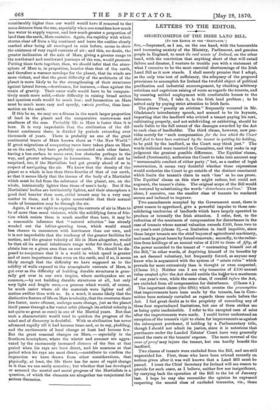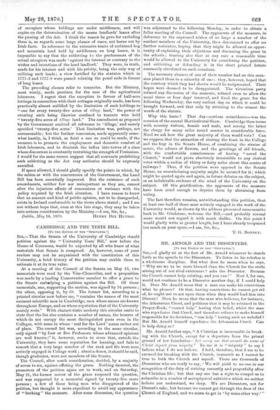LETTERS TO THE EDITOR.
SHORTCOMINGS OF THE IRISH LAND BILL.
[TO THE EDITOR OF TWO " SPECTATOR:1
SIR, —Impressed, as I am, on the one hand, with the honourable and increasing anxiety of the Ministry, Parliament, and genuine people in England, to meet the real wants of Ireland, on the other hand, with the conviction that anything short of that will entail failure and disaster, I venture to trouble you with a statement of what I conceive to be the most essential shortcomings of the Irish Land Bill as it now stands. I shall merely premise that I adopt, as the only true test of sufficiency, the adequacy of the proposed provisions to accomplish for Ireland the twofold object of political pacification and industrial encouragement, by checking arbitrary evictions and capricious raising of rents as regards the tenants, and by ensuring settled employment with comfortable homes to the labourers. That, I take it, is the Irish land problem ; to be solved only by paying strict attention to Irish facts.
The phrase "penalty on eviction" frequently recurred in Mr. Gladstone's introductory speech, and seemed to be its keynote„ importing that the landlord who evicted a tenant paying his rent, cultivating properly, and not subdividing or subletting, should be made liable to the full extent of the damages awarded by the Act to each class of landholder. The third clause, however, now pro- vides merely for "such compensation for the loss which the Court shall find to have been sustained by the tenant in quitting his holding, to be paid by the landlord, as the Court may think just." The- words italicized were inserted in Committee, and they make in my judgment the greatest possible difference. The Equities' clause, indeed (fourteenth), authorizes the Court to take into account any "unreasonable conduct of either party ;" but, as a matter of legal construction, it seems very doubtful whether these expressions would authorize the Court to go outside of the distinct enactment which limits the tenant's claim to such 'loss' as he can prove. The Equities' clause on this view might reduce, but could not augment, the tenant's claim. The original scope of the Bill would be restored by substituting the words 'disturbance and loss.' Thus- alone, I conceive, can the smaller class of tenants be rendered secure and induced to improve.
Two amendments accepted by the Government must, there is great reason to apprehend, give a powerful impulse to those con- solidating tendencies of landlords which have largely operated to. produce or intensify the Irish situation. I refer, first, to the, reduction of the maximum of compensation for disturbance in the- case of tenants whose annual valuation exceeds £100, from two to one year's rent (clause 3),—a limitation in itself impolitic, since these larger tenants are the chief buyers of agricultural machinery,. and must be great losers by forced removals ; secondly, to the reduc- tion from holdings of an annual value of £100 to those of fifty, of the power accorded to the tenant of "contracting himself out of the Bill," in other words, of depriving himself of its benefits by an act deemed voluntary, but frequently forced, as anyone may know who is acquainted with the system of "estate rules" which prevails far more extensively than is thought or even suspected. (Clause 10.) Neither can I see why tenancies of £100 annual value created after the Act should entitle the hoVer to a maximum. of one year's rent, while the same class, if created before the Act, are excluded from all compensation for disturbance. (Clause 4.) The important clause (the fifth) which creates the presumption that improvements have been made by the tenants, has in Com- mittee been seriously curtailed as regards those made before the Act. I feel great doubt as to the propriety of conceding any of these four superinduced limitations, but one of them strikes me as being quite inadmissible. I refer to the excepted case of sales after the improvements were made. I could better understand an exception of the tenant's right to claim for improvements as against the subsequent purchaser, if holding by a Parliamentary title, though I should not admit its justice, since it is notorious that purchasers under the Landed Estates' Court have very generally raised the rents at the tenants' expense. The mere reversal of the onus of proof may injure the tenant, but can hardly benefit the landlord.
Two classes of tenants were excluded from the Bill, and are still unprovided for. First, those who have been evicted recently on notices given after it was well known that a Land Bill must be passed. I trust the Chief Secretary for Ireland will see reason to provide for such cases, as I believe, neither few nor insignificant, by carrying back the operation of the Bill to the 1st of January last. I hope he may also reconsider the opinion he expressed respecting the second class of excluded tenancies, viz., those. of occupiers whose holdings are under middlemen, and will expire on the determination of the mesue landlords' leases after the passing of the Act. I think the reason he gave for excluding them is, as regards some large classes of cases, not borne out by Irish facts. In reference to the extensive tracts of reclaimed bog and mountain land held by middlemen on long leases, it is impossible to say that the subletting to the predecessors of the actual occupiers was made against the interest or contrary to the wishes and intentions of the head landlord.' They were, in truth, made for his interest and with his privity, being the only way of utilizing such lands ; a view fortified by the statutes which in 1771-2 and 1777-8 were passed relaxing the penal code in favour of long leases.
The preceding clauses refer to tenancies. But the Ministry, most wisely, made provison for the case of the agricultural labourers. I regret that the expeption in favour of half-acre lettings in connection with their cottages originally made, has been practically almost nullified by the limitation of such holdings to "one for every twenty-five acres of tillage land," the power of creating such being likewise confined to tenants who hold "twenty-five acres of tillage land." The amendment as proposed by the Government omitted all reference to tillage,' and merely specified twenty-five acres.' That limitation was, perhaps, not unreasonable ; but the further concession, made apparently some- what hastily, is, I think, as fatal a one as could be made, if the measure is to promote the employment and domestic comfort of Irish labourers, and to diminish the influx into towns of a class whose discontent is constantly recruiting the strength of Fenianism. I would for the same reason suggest that all contracts prohibiting such subletting as the Act may authorize should be expressly annulled.
If space allowed, I should gladly specify the points in which, by the action or with the concurrence of the Government, the Land Bill has been essentially improved. But the existence of such amendments, neither few nor unimportant as they are, cannot alter the injurious effects of concessions at variance with the policy required by the Irish situation. I have reason to know that an amount and kind of public opinion, not to be disregarded, exists in Ireland conformable to the views above stated ; and I am not without hope that, even at this late stage, they may be taken into serious consideration by the Ministry.—I am, Sir, &e.,































 Previous page
Previous page